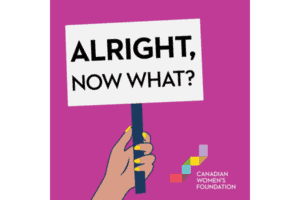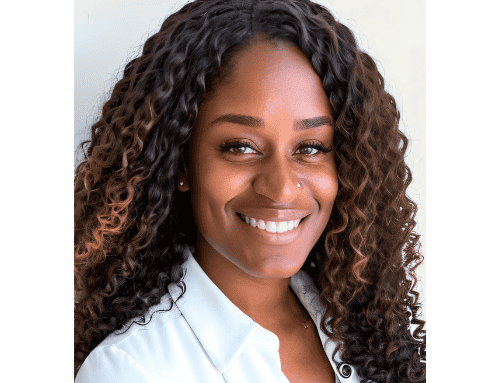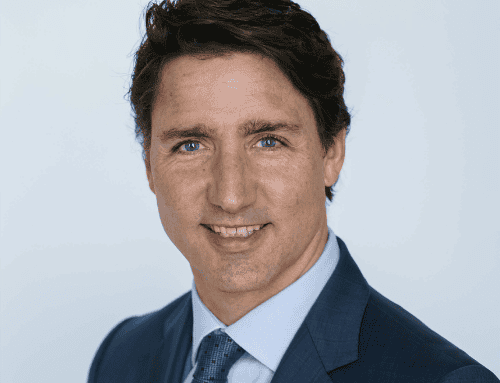 The anticipated overturn of Roe v. Wade, a 1973 US Supreme Court decision that established abortion access as a constitutional right, highlights the importance of reproductive justice everywhere. Achieving a gender equal Canada requires true reproductive justice. The ability to make informed choices about your health should be a basic right. In Canada, even with legislative standards and legal precedence in place, the lived realities of women, girls, and Two Spirit, trans, and non-binary people have not matched that right.
The anticipated overturn of Roe v. Wade, a 1973 US Supreme Court decision that established abortion access as a constitutional right, highlights the importance of reproductive justice everywhere. Achieving a gender equal Canada requires true reproductive justice. The ability to make informed choices about your health should be a basic right. In Canada, even with legislative standards and legal precedence in place, the lived realities of women, girls, and Two Spirit, trans, and non-binary people have not matched that right.
What are the implications of this news in Canada? What’s the state of reproductive rights and access here today?
Meghan Doherty, Director of Global Policy & Advocacy at Action Canada for Sexual Health and Rights, joins us to talk about it. She has over two decades of experience advocating for sexual and reproductive rights in Ireland, Canada, and internationally. As Action Canada’s Director of Global Policy & Advocacy, Meghan is responsible for leading the implementation of Action Canada’s strategic objectives to advance sexual and reproductive rights in global policies, with a particular focus on the UN Human Rights Council. Throughout her career, Meghan has collaborated with activists, parliamentarians, civil society organizations, UN agencies and government officials to support the realization of women’s human rights, including sexual and reproductive rights.
Transcript
00:00:04 Andrea
The anticipated overturn of Roe v. Wade, a 1973 US Supreme Court decision that established abortion access as a constitutional right, highlights the importance of reproductive justice everywhere. What are the implications of this news in Canada? And what’s the state of reproductive rights and access here today?
Welcome to Alright, Now What?, a podcast of the Canadian Women’s Foundation. We put an intersectional feminist lens on stories that make you wonder “Why is this still happening?” We explore systemic roots and strategies for change that will move us closer to the goal of gender justice.
The work of the Canadian Women’s Foundation and our partners takes place on traditional First Nations, Métis, and Inuit territories. We are grateful for the opportunity to meet and work on this land. However, we recognize that land acknowledgements are not enough. We need to pursue truth, reconciliation, decolonization, and allyship in an ongoing effort to make right with all our relations.
00:01:10 Andrea
The ability to make informed choices about your health and access health services should be a basic right. In Canada, even with the legislative standards and legal precedence in place, the lived reality of women, girls, and Two Spirit, trans, and non-binary people have not matched that right. Their autonomy, safety, self-determination, and ability to make true choices have suffered.
Some have been uniquely impacted. Indigenous women and women with disabilities have faced forced sterilization and forced contraception. Marginalized women and those with low incomes experience many barriers to reproductive health. Young people have had uneven sexual health and healthy relationship education at school.
Achieving a gender equal Canada requires true reproductive justice. This includes access to a full spectrum of supports, including abortion services, birth control, health education, and family planning. But access differs wildly depending on who you are and where you live.
Meghan Doherty, Director of Global Policy & Advocacy at Action Canada for Sexual Health and Rights, joins us to talk about it. She has over two decades of experience advocating for sexual and reproductive rights. She leads Action Canada’s work to advance these rights in global policies. In her role, she collaborates with activists, parliamentarians, civil society organizations, UN agencies and government officials to support the realization of women’s human rights.
00:02:44 Meghan
What started me in my journey doing this work is I used to live in Ireland for about 10 years, during a time when abortion was criminalized there, so before they had the referendum. And it was the first time that I was really confronted with, in very practical terms, what would happen if I had wanted to have an abortion in a place where abortion was criminalized. And that really motivated me to get involved with local women’s movements, local abortion rights organizations, and eventually I went to go work at the Irish Family Planning Association, which is the Planned Parenthood of Ireland.
Through that work I started to do work around human rights related to abortion, in particular, but also a broad range of sexual and reproductive rights. And when I came back to Canada, this informs a large part of the work that I do with Action Canada for Sexual Health and Rights, which is working within the UN, United Nations, system for greater accountability at a global level for sexual and reproductive rights.
And so at Action Canada, what we do is we work at all different levels and really try and link our very, you know, local work which is our direct services to people who are in need of information and access to abortion to our national work, really trying to push forward policies that will improve access for all on sexual and reproductive rights, linked to the international human rights system, which you know provides a great foundation for and great framework for accountability within Canada, but also globally on these issues.
00:04:23 Andrea
So, give us a sense, I think we need to sometimes take a step back here, explain to us what’s the connection between the issues of gender justice at large and reproductive justice.
00:04:34 Meghan
I think that you can’t separate gender justice from reproductive justice for a whole lot of reasons. But when we think about the root causes of the injustice related to gender and sexuality and reproduction, we’re really looking at some of the same root causes, which can be understood in terms of patriarchal gender norms. These patriarchal gender norms are entrenched in all parts of our social, economic, cultural lives and manifest in laws and policies and budgets.
At their hearts, what they are designed to do is to create a situation where gender is used to subjugate and exclude and marginalize particular people based on their gender and really elevate and prioritize men, all of the norms that are associated with masculinity. And so when we think about reproduction and sexuality, anything that is outside of that very narrow construction of, you know a heteronormative, patriarchal relationship.
Think about the stigma that is attached to abortion. A large part of it can be attributed to stigma that is really born from this, the idea that you know all sexuality should be about reproduction. And that translates into real human rights violations, limited access to sexual and reproductive services that people might need. And women, in particular, but all people who are stepping outside of any sort of normative framework of sexuality and gender are really not prioritized in the best case and really, really prevented and stigmatized from accessing the services that they need. And it’s not a coincidence that it is women and gender nonconforming people, trans people, non-binary people that are really subject to the harms of these gender norms that are entrenched in these structures.
You can never begin to tackle reproductive injustice without looking at gender injustice. You can see it in in so many different spaces- within who’s making the decisions? What are they making decisions about? Where is the money going? Why is the money going to these things, and who do they benefit?
In addition to gender justice and reproductive justice, we can’t also tackle those issues without considering racial justice and economic justice, and really seeing the interconnections between all of these different issues.
We see the full picture because people are, they live full lives. We have to be very cognizant not to reduce down reproductive justice just towards access to abortion or gender justice to things like gender parity in corporate CEO boards. We have to really look at the full picture and to see what are the interconnections and how do we engage with that full picture so that when the rights are advanced for a particular issue that everyone can benefit from that.
00:07:44 Andrea
And how about now in 2022? What are the core issues we need to keep top of mind?
00:07:49 Meghan
So what’s happening in the US right now is the result of over 20 years of work by essentially anti- democratic actors to erode sexual and reproductive rights at the local level, at the state level, and now as we see with the leaked decision of the Roe v. Wade case. The implications of that is that it would remove the constitutional protection for abortion in the US and put it back to the states. And over half of the states in the United States have what they call trigger laws, so that should Roe fall, they will immediately put in place these restrictions that are going to essentially like inhibit people from accessing abortion, and that is going to cause such harm.
But that harm is not going to be felt equally. We see people who are on low-income, racialized people, young people, undocumented people, the same people who have access issues in Canada have the same issues in the United States and they will be essentially criminalized in many states for seeking what is a very normal health care procedure.
In relation to Canada and sexual and reproductive health and rights, there are some key issues that we need to keep top of mind and really be pushing forward on: the rollback of rights around the world in relation to sexuality and gender and abortion, in particular, but also a broad range of women’s rights and the most visible one right now is the leak of the Roe v. Wade decision that will rollback abortion rights in the US. You know, in Canada, we have a very different political and legal and policy context for abortion.
The way abortion is regulated in Canada is such that it’s a health service, which is rightfully so because abortion is health care. You know there has been concerted efforts over 20 years or so of a slow chipping away of some of the fundamentals that are necessary for people to be able to realize their sexual and reproductive rights.
The high-profile cases that we’re hearing about, particularly in the United States, it’s not something that’s just happening today. This has been happening for 20 years, the slow chipping away, the slow erosion of rights.
In Canada, we want to make sure that we are keeping our focus on access to abortion, that we are, we are not allowing the discourse to shift into a debate of who’s for and who’s against. One, it’s not helpful. Two, abortion is, it just is and it’s a health service and needs to be treated as such.
We need to be focusing on access and what that means is looking at who doesn’t have access and why. For us, what we will be looking at in 2022 is the realization of some of the commitments that the government has made around how to expand access to abortion in Canada, particularly for people who are living in remote areas, people who are living in poverty, people who are on low income, young people, people who are new to Canada and particularly undocumented people.
You know, last year over a third of the calls to our access line were from undocumented people. There are additional barriers for people without immigration papers to access health services beyond just the financial implication.
There’s a promise of delivering on pharmacare, you know, so we expect over the next year significant discussions and there will be significant advocacy around ensuring that contraception, the full range of contraception, is covered under pharmacare. We know that the same people who have access issues for abortion are the same people who have access issues for contraception and many of the issues are similar.
A big barrier for contraception is cost because it is not covered under our health care system writ large. For many people, it’s covered under their private insurance through work, but for people who are on part-time, people who aren’t working, the cost of contraception can be quite prohibitive.
The third piece is around comprehensive sexuality education. You know, it’s very challenging for the federal government to undertake because of jurisdictional issue. But often that’s used as a bit of an excuse for inaction. You know, what are those early interventions that are going to not only help to improve health outcomes as people learn how to connect to services, but also to address some of these harmful gender norms that we were talking about at the beginning?
You know we need to be talking about consent. We need to be talking about healthy relationships, the emotions, what are the impacts of harmful gender norms on men and women, on nonbinary people, on LGBT people. Gender norms-we just take them for granted that we often don’t even see how they manifest, and you know, learning how to identify them and think critically about them is a really key intervention, particularly for gender-based violence.
The federal government -they are responsible for ensuring that those rights are fulfilled across the country, regardless of the jurisdictional issues that are in place. And so, there are ways in which they can fulfil their obligations in this respect and that they can work with the provinces around meeting the, we have guidelines in Canada, national guidelines on sexuality education, so meeting them, training teachers to be able to provide it and really recognizing it as the priority that it needs to be for gender justice and also for reproductive justice.
Community-based organizations and the feminist organizations and the alliances that are working to bring these issues to the forefront -they need support. Funding for these organizations are often at the whims of different governments. We need a more sustainable approach to supporting organizations who are doing this really, really important work and understanding that it takes advocacy and advocacy is about creating change. Creating change sometimes doesn’t look the way that a lot of people wish it would. We need to recognize that, but that it is only through these struggles that we are able to create any sort of sustainable and lasting change in our communities, in our country and all the way up to to the global level.
These movements for change and these policy proposals and these ideas – they’re really driven by progressive feminist civil society movements. At Action Canada, one of our strategic objectives is around movement building and we believe that nobody, no organization can do can create social change on its own and we need a lot of voices from a lot of different perspectives to be able to push these changes forward.
00:14:57 Andrea
And what can an individual do?
I mean, we do care about greater access and rights in Canada here. And I always wonder if just for the individual person maybe doesn’t have a lot of say in decision making, what can we do with that intersectional feminist approach you were talking about?
00:15:15 Meghan
The personal is political, always, and so there are lots of ways that people can participate, in thinking about how to help people kind of navigate the fallout from the Roe decision.
First one is support the local or regional or national racial justice organization, the disability rights organizations, the organizations that are working on those key issues that are going to really breakthrough some of the barriers that are going to be put in place in the United States. And we hope that will not be put in place in Canada, but that we need to be thinking about access to abortion from this broader perspective.
I would also say support your local sexual health centers. These organizations provide a vital service in their community and they are so severely underfunded and are hanging on by a thread. Support them in many ways. You can donate to them. You can join their board. You can join their newsletter. You can show up for their event.
I think the next one is to be very informed about where your local representatives stand on particular issues and then be very vocal with them about what’s important to you. Our local representatives, they care about what their constituents have to say and so seek them out and tell them.
Another example is if you’re a student and you’re in school, students across the country organized together to demand better sex ed from their school boards from their schools and from their province. In medical schools, the average training around medical abortion provision is less than an hour so demand the greater training for abortion provision.
And the basic, but also fundamental part of responding and contributing to positive change is to have those conversations with your community, with your family, with your friends, to be really open to having those hard conversations.
The personal is political.
00:17:13 Andrea
Alright, now what?
Meghan’s suggestions give us a great way forward.
Collectively, we do need to ensure our leaders pursue stronger policies to build our access to sexual and reproductive health expertise, education and support. Access needs to grow and never get clawed back. And provincial and territorial leaders must invest in local health services to meet the diverse needs of everyone in their regions.
Those of us who care about gender justice must be tireless in upholding the value of reproductive justice nationally and globally, even as our rights get questioned or shaken.
We have to hold our leaders accountable and support gender, justice advocates and organizations who pursue these goals.
00:18:01 Andrea
Please listen, subscribe, rate and review this podcast and share it with others. If you appreciate this content, if you want to get in on the efforts to build a gender equal Canada, please donate today and consider becoming a monthly donor. And thank you for being tireless in your support for gender justice.






